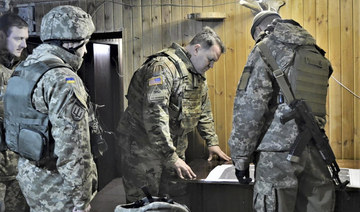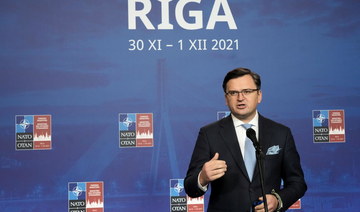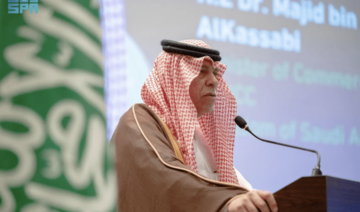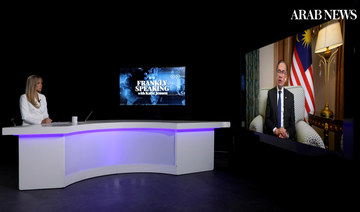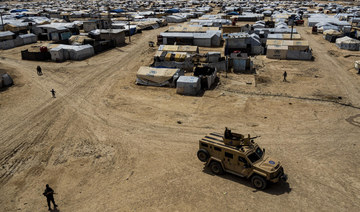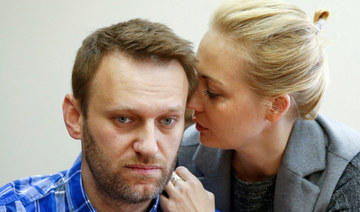MOSCOW: Presidents Joe Biden and Vladimir Putin will speak in a video call Tuesday, the White House and Kremlin said, as tensions between the United States and Russia escalate over a Russian troop buildup on the Ukrainian border that’s seen as a sign of a potential invasion.
Biden will press US concerns about Russian military activities on the border and “reaffirm the United States’ support for the sovereignty and territorial integrity of Ukraine,” White House press secretary Jen Psaki said Saturday, confirming the planned call after first word came from Moscow.
Putin will come to the call with concerns of his own and intends to express Russia’s opposition to any move to admit Ukraine into the NATO military alliance. Kremlin spokesman Dmitry Peskov said “the presidents will decide themselves” how long their talk will last.
The last known call between the leaders was in July, when Biden pressed Putin to rein in Russia-based criminal hacking gangs launching ransomware attacks against the United States. Biden said the US would take any necessary steps to protect critical infrastructure from such attacks.
Ransomware attacks have continued since then, though perhaps none has been as alarming as the one from May that targeted a major fuel pipeline and resulted in days of gas shortages in parts of the US
Russia is more adamant than ever that the US guarantees that Ukraine will not be admitted to the NATO military alliance. But NATO’s secretary-general, Jens Stoltenberg, said this past week that Russia has no say in expansion plans by other countries or the alliance. Numerous former US and NATO diplomats say any such Russian demand to Biden would be a nonstarter.
US intelligence officials, meanwhile, have determined that Russia has massed about 70,000 troops near its border with Ukraine and has begun planning for a possible invasion as soon as early next year, according to a Biden administration official who was not authorized to discuss that finding publicly and spoke on the condition of anonymity.
The risks for Putin of going through with such an invasion would be enormous.
US officials and former American diplomats say while the Russian president is clearly laying the groundwork for a possible invasion, Ukraine’s military is better armed and prepared today than in the past, and that sanctions threatened by the West would do serious damage to the Russian economy.
“What I am doing is putting together what I believe to be, will be, the most comprehensive and meaningful set of initiatives to make it very, very difficult for Mr. Putin to go ahead and do what people are worried he may do,” Biden said Friday.
Ukrainian officials have said Russia could invade next month. Ukraine’s defense minister, Oleksii Reznikov, said the number of Russian troops near Ukraine and in Russia-annexed Crimea is estimated at 94,300, and warned that a “large-scale escalation” is possible in January.
Ukraine’s president, Volodymyr Zelenskyy, recently charged that a group of Russians and Ukrainians planned to attempt a coup in his country and that the plotters tried to enlist the help of Ukraine’s richest man, Rinat Akhmetov.
Russia and Akhmetov have denied that any plot is underway, but the Russians have become more explicit recently in their warnings to Ukraine and the United States.
Biden is also expected to speak with Zelenskyy in the coming week, according to a person close to the Ukrainian leader. This person was not authorized to comment publicly before the announcement of the call and spoke on the condition of anonymity.
The Kremlin said Friday that Putin, during his call with Biden, would seek binding guarantees precluding NATO’s expansion to Ukraine. Biden tried to head off the demand in comments to reporters Friday before leaving for a weekend stay at Camp David.
“I don’t accept anyone’s red line,” Biden said.
Psaki said in a brief statement Saturday that Biden and Putin will discuss a range of topics in the US-Russia relationship, “including strategic stability, cyber, and regional issues.”
She said Friday that the administration would coordinate with European allies if it moved forward with sanctions. She alluded to Russia’s 2014 annexation of Crimea, the Black Sea peninsula that had been under Ukraine’s control since 1954. Russia has also backed separatists in eastern Ukraine in a 7-year conflict that has cost over 14,000 lives.
“We know what President Putin has done in the past,” Psaki said. “We see that he is putting in place the capacity to take action in short order.”
US-Russia relations have been rocky since Biden took office.
His administration has imposed sanctions against Russian targets and called out Putin for the Kremlin’s interference in US elections, cyberactivity against American companies and the treatment of opposition figure Alexei Navalny, who was poisoned last year and later imprisoned.
When Putin and Biden met in Geneva in June, Biden warned that if Russia crossed certain red lines — including going after major American infrastructure — his administration would respond and “the consequences of that would be devastating.”
Biden, Putin set video call Tuesday as Ukraine tensions grow
https://arab.news/bnrx8
Biden, Putin set video call Tuesday as Ukraine tensions grow
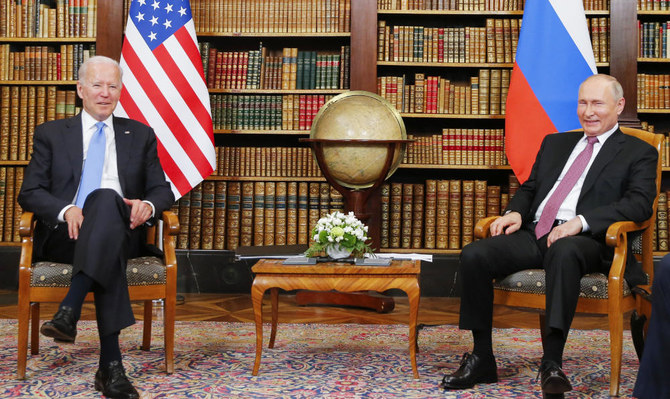
- Ukraine’s president, Volodymyr Zelenskyy, recently charged that a group of Russians and Ukrainians planned to attempt a coup in his country and that the plotters tried to enlist the help of Ukraine’s richest man, Rinat Akhmetov
2,000 religious leaders attend Muslim World League conference in Kuala Lumpur
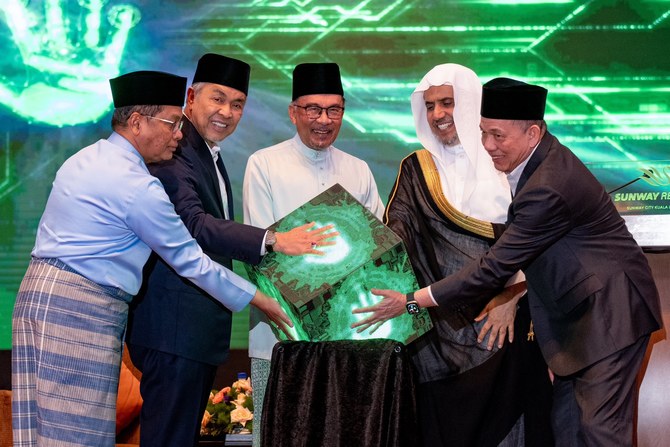
- MWL co-organized international gathering with the Malaysian government
- Prime Minister Anwar Ibrahim delivers speech during the conference
KUALA LUMPUR: More than 2,000 religious leaders and scholars from 57 countries gathered in Kuala Lumpur on Tuesday for a conference organized by the Muslim World League to discuss the role of religion in facilitating dialogue and peace initiatives.
The MWL, an international non-governmental Islamic organization founded in Saudi Arabia in 1962, organized the 2024 International Conference of Religious Leaders with Malaysia’s Department of Islamic Development.
The conference was inaugurated by Malaysian Prime Minister Anwar Ibrahim and MWL Secretary-General Sheikh Dr. Mohammad bin Abdulkarim Al-Issa.
“This religious conference will be an annual feature in Malaysia since it has proved successful in building an understanding and affinity among religions in the world, as well as in Malaysia,” Anwar said during his speech.
“In a conference like this, we can observe the things that need to be done and need to be improved among Muslims, Christians, Buddhists or Hindus. We want to listen to your advice, criticisms and suggestions.”
While about two-thirds of Malaysia’s more than 33 million population are Muslims, there are also large Buddhist, Hindu, and Christian minorities in the country.
“Religious leaders should take an active, effective and courageous role in promoting peace and justice. It is the duty of religious leaders to ensure that governance is guided by strong moral and ethical values,” Anwar said.
Al-Issa said the conference seeks to have a tangible impact.
“This international conference was attended by international, religious, political, intellectual, academic and media leaders. It is considered the first nucleus of a major breakthrough through a number of initiatives and programs around the world, aiming to enhance friendship and cooperation between nations and peoples,” he said.
“Our world is most in need of true solidarity, solidarity with a tangible impact, and is most in need of awareness of the threats threatening its global peace and the harmony of its diverse national communities in their religions and races.”
US repatriates two dozen Westerners from Syria Daesh camp
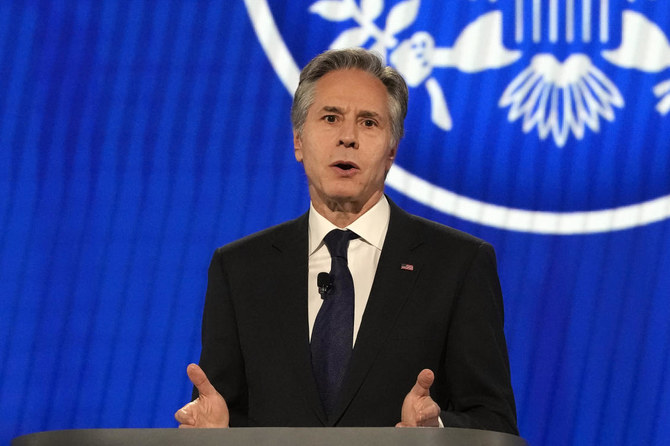
- In a complex operation involving US agencies, Kuwait and pro-US Kurdish fighters, the United States repatriated 11 US citizens
- The US also facilitated the repatriation of six Canadian citizens, four Dutch citizens, and one Finnish citizen
WASHINGTON: The United States announced Tuesday it had brought back two dozen Western citizens, half of them Americans, from a camp for Daesh prisoners in Syria, its largest-ever repatriation as thousands languish.
In a complex operation involving US agencies, Kuwait and pro-US Kurdish fighters, the United States repatriated 11 US citizens, including five minors, as well as a nine-year-old non-US sibling of an American, Secretary of State Antony Blinken said.
The United States in the same operation facilitated the repatriation of six Canadian citizens, four Dutch citizens, and one Finnish citizen, among them eight children, he said.
“This is the largest single repatriation of US citizens from northeast Syria to date,” Blinken said in a statement.
“The only durable solution to the humanitarian and security crisis in the displaced persons camps and detention facilities in northeast Syria is for countries to repatriate, rehabilitate, reintegrate and, where appropriate, ensure accountability for wrongdoing,” he said.
The United States has long pushed European governments to bring back nationals who went to fight for the Daesh group — or their children.
Most European countries have done so but slowly and despite initial reservations, especially in countries with a history of jihadist attacks at home such as France and Britain.
Blinken did not identify the people who were repatriated.
The New York Times, quoting unidentified sources, said they included an American woman, whose Turkish husband apparently took the family to Daesh territory and was later killed, and their nine children.
The Star Tribune of Minneapolis reported last week that a man who joined Daesh but then became a valuable informant was seeking the repatriation of two sons, one apparently the non-US citizen, to be raised by their grandparents in Minnesota.
The repatriations remain controversial in the United States as well, with the administration of former president Donald Trump in one prominent case insisting that a young woman seeking to return was not legitimately a US citizen.
The Kurdish-led Syrian Democratic Forces (SDF) helped US forces crush the Daesh group.
Five years after the extremists were ousted from their last territory, the SDF still holds more than 56,000 detainees with alleged or perceived links to the Daesh group.
Kurdish authorities have been asking foreign governments to repatriate their nationals but Western governments have responded slowly for fear of domestic backlash.
Putin starts new six-year term with challenge to the West
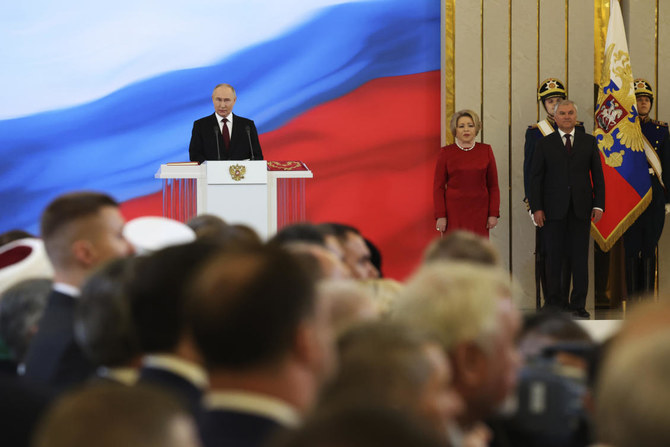
- Putin is sworn in for fifth term
- US and many EU states stay away
- Putin says he’s not ending dialogue with West
MOSCOW: Russian President Vladimir Putin said it was up the West to choose between confrontation and cooperation as he was sworn in for a new six-year term on Tuesday at a Kremlin ceremony that was boycotted by the United States and many of its allies.
More than two years into the war in Ukraine, Putin said he wanted to “bow” before Russia’s soldiers there and declared in his inauguration speech that his landslide re-election in March was proof the country was united and on the right track.
“You, citizens of Russia, have confirmed the correctness of the country’s course. This is of great importance right now, when we are faced with serious challenges,” he told dignitaries in a gilded Kremlin hall where a trumpet fanfare sounded to greet his arrival.
“I see in this a deep understanding of our common historical goals, a determination to adamantly defend our choice, our values, freedom and the national interests of Russia.”
At 71, Putin dominates the domestic political landscape. Leading opposition figures are in prison or exile, and his best known critic, Alexei Navalny, died suddenly in an Arctic penal colony in February.
Yulia Navalnaya, the late dissident’s wife, urged supporters in a video on Tuesday to keep up the struggle against Putin. “With each of his terms, everything only gets worse, and its’ frightening to imagine what else will happen while Putin remains in power,” she said.
On the international stage, Putin is locked in a confrontation with Western countries he accuses of using Ukraine as a vehicle to try to defeat and dismember Russia.
Putin told Russia’s political elite after being sworn in that he was not rejecting dialogue with the West, including on nuclear weapons.
“The choice is theirs: do they intend to continue trying to restrain the development of Russia, continue the policy of aggression, incessant pressure on our country for years, or look for a path to cooperation and peace?” he said.
With Russia’s troops advancing gradually in eastern Ukraine, the top US intelligence official said last week that Putin appeared to see domestic and international developments trending in his favor and the conflict was unlikely to end anytime soon.
It remains unclear how far Putin will seek to press the war and on what terms he might discuss ending it — decisions that will depend in part on whether Joe Biden or Donald Trump wins the US presidential election in November. Ukraine says peace can only come with a full withdrawal of Russia’s troops, who control nearly 20 percent of its territory.
Western absentees
Putin, in power as president or prime minister since 1999, will surpass Soviet leader Josef Stalin and become Russia’s longest-serving ruler since 18th century Empress Catherine the Great if he completes a new six-year term. He would then be eligible to seek re-election again.
He won victory by a record margin in a tightly controlled election from which two anti-war candidates were barred on technical grounds. The opposition called it a sham.
The United States, which said it did not consider his re-election free and fair, stayed away from Tuesday’s ceremony.
Britain, Canada and most EU nations also decided to boycott the swearing-in, but France said it would send its ambassador.
Ukraine said the event sought to create “the illusion of legality for the nearly lifelong stay in power of a person who has turned the Russian Federation into an aggressor state and the ruling regime into a dictatorship.”
Sergei Chemezov, a Putin ally, told Reuters before the ceremony, that Putin brought stability, something which even his critics should welcome.
“For Russia, this is the continuation of our path, this is stability – you can ask any citizen on the street,” he said.
Nuclear tensions
Russia’s relations with the United States and its allies are at their lowest point since the Cuban Missile Crisis of 1962, when the world came to the brink of nuclear war.
The West has provided Ukraine with artillery, tanks and long-range missiles, but NATO troops have not joined the conflict directly, something that both Putin and Biden have warned could lead to World War Three.
Underscoring the rise in nuclear tensions, Russia said on Monday it would practice the deployment of tactical nuclear weapons as part of a military exercise, after what it said were threats from France, Britain and the United States.
One of the decisions awaiting Putin in his new term will be whether to seek to renew or replace the last remaining treaty that limits Russian and US strategic nuclear warheads. The New START agreement is due to expire in 2026.
In line with the constitution, the government resigned at the start of the new presidential term. Putin ordered it to remain in office while he appoints a new one which is expected to include many of the same faces.
Modi, Gandhi urge more Indians to vote as election reaches halfway mark
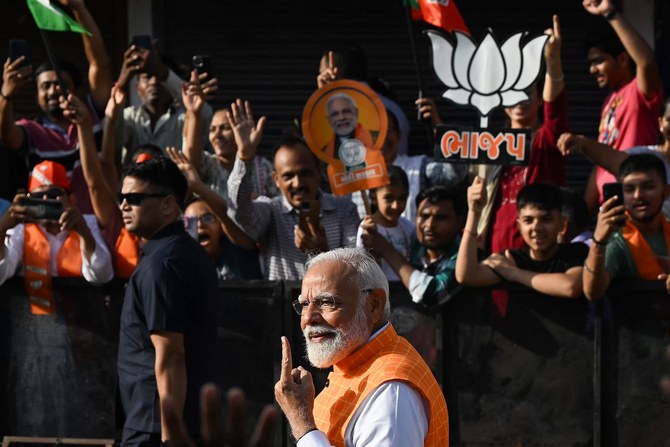
- Voter turnout in the first 2 phases of election was lower than in 2019
- With phase 3 complete, half of voters should have already cast ballots
New Delhi: Prime Minister Narendra Modi and his chief opponent Rahul Gandhi called on voters to cast their ballots on Tuesday, as India’s massive general election reached its halfway mark with a turnout lower than expected.
More than 968 million people have been registered to vote and the polls are held in seven phases from April 19 until June 1. Some of India’s 28 states and eight federally governed territories complete the process on a single day, while others spread it out.
The first two phases of the election were held on April 19 and April 26 in 190 constituencies, with a voter turnout of 66.1 percent and 66.7 percent respectively — about 4 percent lower than in 2019.
In the third phase on Tuesday, citizens from 94 constituencies in 12 states went to the polls, including in Modi’s home state of Gujarat.
“Urging all those who are voting in today’s phase to vote in record numbers. Their active participation will certainly make the elections more vibrant,” the incumbent prime minister said on X after casting his ballot.
Modi is eyeing a rare third straight five-year term in power, targeting 400 seats for the National Democratic Alliance led by his Hindu nationalist Bharatiya Janata Party, which has been in power since 2014.
He is challenged by an alliance of two dozen opposition parties — the Indian National Developmental Inclusive Alliance, or INDIA, led by the Congress Party, which has ruled the country for close to 45 years since its independence in 1947.
Gandhi, Modi’s key contender and Congress leader, is the son of Rajiv Gandhi, a grandson of Indira Gandhi, and a great-grandson of Jawaharlal Nehru — all of whom had served as prime ministers of India.
Congress plunged to a historic low when it was swept out of power by the BJP in the 2014 election, and won its second-lowest number of 52 seats in 2019.
As the turnout showed a declining trend in the first and second phases of the ongoing poll, Gandhi also took to social media to ask voters to show up.
“I request all of you to come out in large numbers and vote to protect your rights,” he said. “Remember, this is not an ordinary election, it is an election to protect the democracy and constitution of the country.”
More than 498 million people were eligible to vote in the first three phases, or 60 percent of all registered voters. The total number of parliamentary seats up for grabs is 283 out of 543.
The party or coalition that wins at least 272 seats will form the government.
Although surveys suggest Modi will win a majority in parliament easily, analysts say a repeat of his landslide victories in 2014 and 2019 is unlikely.
“I think the election has not gone very satisfactorily for the ruling party led by Prime Minister Narendra Modi. The results may be well below their expectations,” said Anand K. Sahay, a columnist and commentator based in Delhi.
“My own broad sense is that the government is in the doldrums.”
He said Modi was repeating his previous strategy of mobilizing voters through majoritarian Hindu sentiment, omitting the voters’ main concerns, which pre-poll surveys have identified as unemployment and inflation.
“The prime minister of India is holding on to one single narrative, that is ranting against the Muslims of India. A man who regards himself as a very successful prime minister for 10 consecutive years is not talking about issues and the records of the governance. There is a deafening silence on that front,” Sahay told Arab News.
Apoorvanand Jha, a public intellectual and professor at the University of Delhi, said voters were now “weary” of the rhetoric propagated by the BJP, but it was not clear whether that would result in a regime change.
“What people have realized now is that it is only political rhetoric and, actually, there is no governance, so that has created a feeling of unease even in the supporters of this regime,” he said.
“One does not know whether that will lead to a major change or not. But this is a major shift. The myth of the invincibility of Narendra Modi is broken and the myth of the popularity of Narendra Modi is also something that people have started questioning.”
Two suspected Kashmir rebels killed in clash with Indian forces
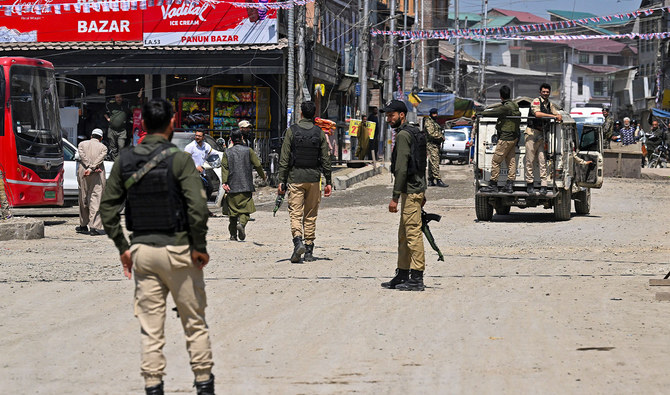
- Firefight between suspected rebels, soldiers takes place amid national elections in disputed territory
- Divided between nuclear-armed India and Pakistan since 1947, Kashir is claimed by both countries in full
SRINAGAR, India: Two suspected rebels were killed in Indian-administered Kashmir during a firefight with soldiers, police said Tuesday, at a time when campaigning for national elections is underway in the disputed territory.
Scores of soldiers besieged a residential area in southern Kulgam district, some 70 kilometers (43 miles) from Kashmir’s biggest city Srinagar, on Monday after armed militants were suspected to be present inside a house.
Two bodies of the suspected rebels “were recovered so far” from the site, police said in a statement posted Tuesday on social media platform X.
Images from the area showed smoke billowing from a house after it caught fire during the skirmish.
Kashmir has been divided between India and Pakistan since their independence in 1947, with both claiming the Himalayan territory in full.
Rebel groups opposed to Indian rule have for decades waged an insurgency in Indian-controlled Kashmir, demanding either independence or a merger with Pakistan.
The conflict has left tens of thousands of civilians, soldiers and militants dead.
Violence and anti-India protests have drastically reduced since 2019, when Prime Minister Narendra Modi’s government canceled the Muslim majority region’s limited autonomy.
But clashes between security forces and rebel groups have increased since voting began last month in India’s six-week election.
Three suspected rebels were killed and a police officer and three soldiers wounded in three separate clashes across the territory in April.
Militants ambushed a military convoy in Kashmir’s south on Sunday, killing one Indian air force corporal and wounding four other troops.



